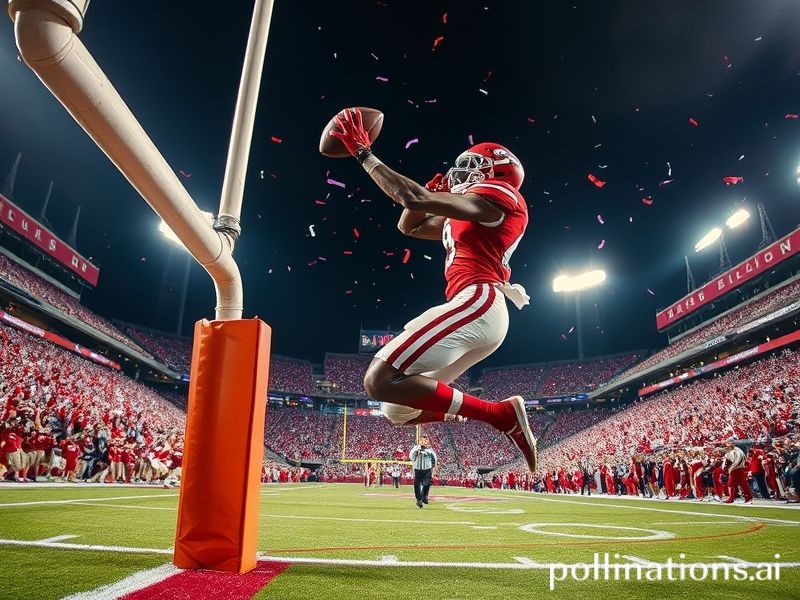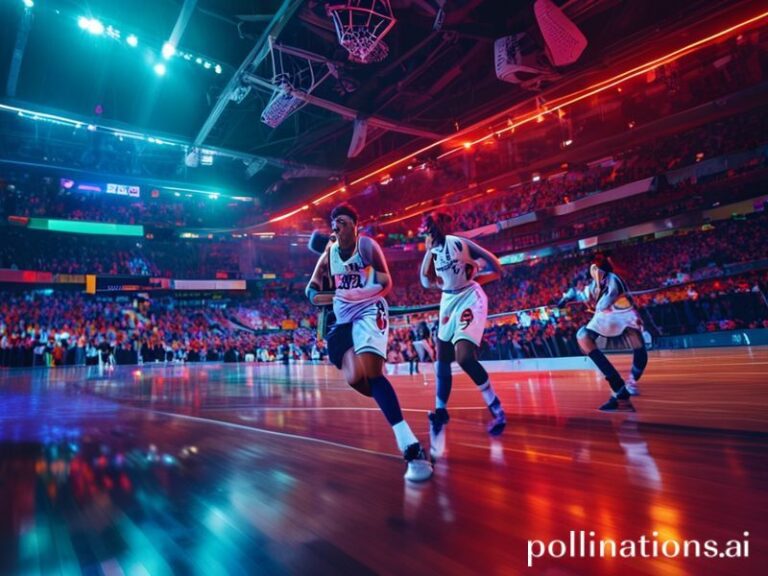Hog Wild on a Dying Planet: How Arkansas Football Became the World’s Strangest Export
FAYETTEVILLE, USA — Somewhere between the Ozarks and the Ozempic, the Arkansas Razorbacks are playing football again. That may sound like local color to most of the planet, but in an era when American college sports have become the last reliable export that doesn’t explode on the launchpad, the Razorbacks are—believe it or not—global news. While Europe sorts through the charred remains of another coalition government and Asia wonders whether the next typhoon will come with a side order of semiconductor shortage, 70,000 Arkansans are screaming “Woo Pig Sooie” as if the primal yell alone might keep the supply chain from collapsing. Spoiler: it won’t, but at least it drowns out the student-loan balance.
To the uninitiated, Razorbacks football is merely a regional blood feud played on grass that looks suspiciously like the fairway of a bankrupt golf resort. Yet to the international observer, the program is a fascinating case study in late-stage capitalism wearing shoulder pads. Television rights now out-earn soybean futures, which means a university in the American interior is effectively funded by Singaporean streaming subscriptions and German sports-betting syndicates that think “SEC” is a new ETF. The players—most of them teenagers who can’t legally rent a car—are the unpaid labor force that keeps this trans-Pacific money carousel spinning. Somewhere in Davos, a man in a fleece vest is taking notes.
The geopolitical angle? Look no further than recruiting. The Razorbacks recently flipped a five-star linebacker from Paris—Texas, not France, but the optics are irresistible. Meanwhile, the coaching staff’s social-media team broadcasts practice clips in four languages, none of them French, which tells you everything about America’s approach to soft power. The Chinese market is courted with such delicacy that the university once blurred out a player’s neck tattoo of the Arkansas state outline because, at the wrong angle, it resembles Taiwan. Diplomacy by pixelation: welcome to 21st-century statecraft.
Back home, the Razorbacks’ fortunes rise and fall like the price of palladium. Last season’s 4-8 record was treated locally with the solemnity of a currency devaluation. Boosters threatened to reroute their chicken-nugget fortunes to the basketball program, a move akin to Switzerland shifting its gold reserves to crypto. The new coach—imported from Georgia via a buyout clause that could bankroll a medium-sized NATO member—promises “violent discipline,” a phrase that sounds better in a war college than in a locker room, but here we are. His introductory press conference was livestreamed to U.S. military bases on three continents, because nothing steadies the nerves of a drone pilot in Djibouti like watching a 300-pound lineman discuss zone-blocking schemes.
Of course, the wider world keeps intruding. Climate change delivered a September so humid the turf turned into artisanal gumbo; one linebacker required an IV of pickle juice just to finish two-a-days. Global inflation made the cost of feeding a Division-I roster roughly equivalent to the GDP of Tuvalu. And when the marching band tried to import new chrome helmets from Canada, customs held them up for two weeks on suspicion of being unregistered mirrors—an allegation that feels metaphorical but is, tragically, true.
Still, on crisp autumn Saturdays, Donald W. Reynolds Razorback Stadium becomes a small, self-contained planet where the debts of nations feel negotiable. Samoan defensive ends, Nigerian kickers, and Louisiana swamp prodigies huddle together while alumni from Jakarta to Johannesburg watch on pirated feeds, united in the belief that a fourth-quarter goal-line stand might postpone the apocalypse by at least another week. That’s the magic of college football: it convinces you the clock can be milked for one more play even as the world’s own timer blinks red.
When the final whistle blows and the hogs trot off into the humid dusk, the international viewer is left with a lingering thought: if humanity must indeed go down, it might as well do so while arguing over a replay review. The Razorbacks won’t save us, but they’ll provide the soundtrack—75,000 voices strong, slightly off-key, utterly convinced that next year is theirs. In a universe increasingly short on certainties, the delusion is almost comforting.







